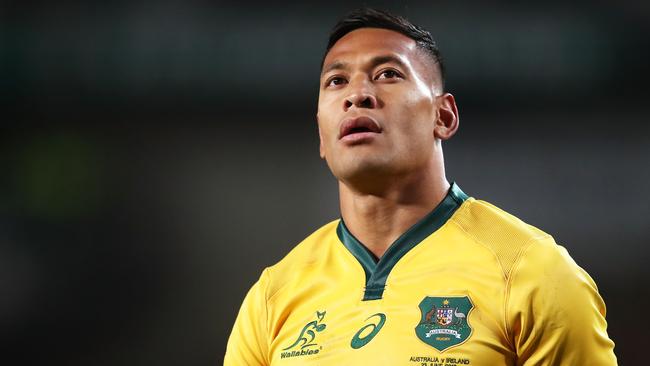
In the final paragraph of his claim, Folau makes clear that he wants an apology and he wants to get back on the field to continue his career.
The rugby champion, who had his playing contract terminated after he posted messages from the Bible on his personal Instagram and Twitter accounts, may be David in a battle with Goliath.
MORE: Folau lodges claim — Izzy’s for real: I want apology, to play again | Profile — Folau’s new best friend
But no one should underestimate the power of his claims or ignore the fundamental principles at stake. The quiet lodgment yesterday is the starting gun for a legal contest that will thunder with serious consequences for employees in workplaces across the country.
A single page in Folau’s eight-page claim sets out clear battlelines alleging that his termination was unlawful. Folau’s first claim is that Rugby Australia and the Waratahs contravened section 772 of the Fair Work Act when they terminated his contract for an unlawful reason of, or for reasons that included, his religion.
Advised by his new legal team of solicitors Macpherson Kelley and Stuart Wood QC, Folau has chosen the Federal Circuit Court because it is a no-costs jurisdiction. Each side pays for its own legal costs regardless of the outcome. And he is one man fighting a mammoth sporting code supported by cashed-up sponsors in a legal contest that may reach the High Court.
Get set for the mother of all battles. Critically, Rugby Australia will bear the onus of proving that it did not terminate Folau’s contract because of his religious faith. Presumably Rugby Australia will have to bring evidence from its management team, establishing who said what to whom, and what role corporate sponsors played in the decision-making process that led to Rugby Australia terminating Folau’s contract.
This legal dispute will invite a court to consider the nature of a man’s religious faith, and certainly Rugby Australia’s pussy-footing around religious freedom needs to be tested.
Folau’s team will likely bring evidence to court about what being a Christian means to Folau. Expert witnesses from theologians and academics to priests and Polynesians may give evidence about the nature of Folau’s personal Christian faith, how evangelicals feel compelled to communicate biblical teachings with others, and that people from the Pentecostal tradition believe the Bible is the last, and only word, for them.


Religious experts might give testimony about whether it made sense, or was it confusing, for Rugby Australia boss Raelene Castle to tell Folau to stick to respectful mentions of his faith when he views teachings in the Bible as founded on love and respect. Many Christians call it the Good Book for a reason.
The courtroom will alter the dynamic between, and the strategic manoeuvring by, both parties to this contest. Rugby Australia’s attempts to mock Folau’s religious faith might work in some sections of the media, and with people who think Christianity should be all rainbows and unicorns.
But dismissing a man’s deep and genuinely held faith should get short shrift in a courtroom.
Folau posted his religious beliefs online in his own time, away from rugby, on personal social media platforms. His legal claim states that uploading “some religious content on his social media accounts … was a manifestation of his religion and consistent with his freedom of religious expression”. “He did this because of his religious faith, which goes to the very essence of his personhood.” And it “certainly did not justify Mr Folau losing his career and livelihood”.
Folau’s faith, his religious conversion, is no secret. He is a devout Christian, born to Tongan parents who raised a family with devotion to their culture and their faith.
In December 2017, Folau was baptised and “born again”.
He is a member of the Truth of Jesus Christ Church, a non-denominational evangelical church in the northwest Sydney suburb of Kenthurst.
Rugby Australia knew all this, and more, when it signed a five-year contract worth $5.7 million with Folau in October last year. It knew about his previous social media posts that contained messages about hell, sin and repentance. In other words, Folau has not hidden his faith. His claim is that Rugby Australia is effectively telling him to hide his faith behind closed doors, which he cannot do as a man of faith.
By the way, Folau has also appeared on the cover of the Star Observer, Australia’s LGBTI magazine, and supported the Bingham Cup, an international gay rugby competition.
Folau’s second legal claim in the filing is for breach of contract when Rugby Australia and the Waratahs terminated it wrongfully by claiming that he brought the game of rugby into disrepute. This will set off another whopping contest over who brought the game into disrepute.
The sporting body that aggressively pursued Folau, turning a biff into a public relations disaster? Or a man who posted a few social media messages online about his Christian faith?
What can Rugby Australia bring to the courtroom as evidence that Folau is at fault? If the tribunal hearing in May is any indication, there might be anecdotal evidence of some people being upset about a rugby player’s social media posts and how that reflects on the game.
Folau’s team will surely shine the light on Rugby Australia’s reputation. To bring a game into disrepute it may be relevant what that reputation is, whether other players have done far worse than post about their religious faith.
And what of Rugby Australia’s behaviour towards Folau because he chooses to make public his Christian beliefs? Is pursuing a man for social media posts drawn from the Bible consistent with being a sporting body that believes in diversity? Or has Rugby Australia’s hypocrisy brought the game into disrepute?
What is clear is that Rugby Australia’s pursuit of Folau has drawn far more attention to the saga than Folau’s original posts.
Maybe Folau’s team will commission polling for the court. Will we discover that more people want to go to a rugby game if Folau is on the field, rather than off it? If it is proved that Folau’s posts don’t adversely affect ticket sales, doesn’t that undercut claims that he brought the game into disrepute? Or do the subjective views of a few corporate sponsors get to determine morality, and therefore what brings the game into disrepute?
Folau’s top-notch legal team has included other claims: that the terms of his contract were unjust, and that he has been unreasonably restrained from his playing career.
And what restraint that has been. Folau has played 73 international games. He is the highest try-scorer in Super Rugby history, and the fourth highest all-time try scorer for Australia.
As Folau made clear to failed conciliation attempts in June, he should have been travelling to Japan for the Rugby World Cup in September where he may have become the Wallabies all-time leading try-scorer. Which is why, depending on what the court decides, Folau may also get damages and Rugby Australia may be up for pecuniary penalties too.
All these questions, and more, may be decided in Melbourne’s Federal Circuit Court later this year. While this intersection between sport, sponsors, religious freedom and the law is sensational, the court’s decision will have profound consequences for workers beyond the rugby field.




Rugby Australia’s pretence of respecting faith and diversity will be challenged in Melbourne’s Federal Circuit Court. It will be formally served with notices of legal proceedings after Israel Folau lodged his claim for unlawful termination late yesterday afternoon.